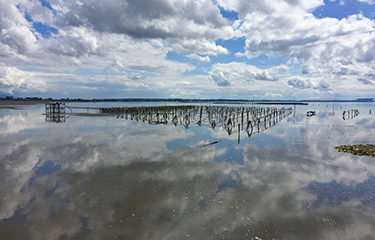A court in the state of Washington ruled in favor of a lawsuit to revoke the Clean Water Act general permit for the state's shellfish farmers last week, shooting down an appeal by Pacific Coast Shellfish Growers Association (PCSGA).
The Center for Food Safety (CFS) and the Coalition to Protect Puget Sound filed the lawsuit against the U.S. Army Corp of Engineers last year, and in October of 2019 a federal court upheld the lawsuit, ruling the Corps’ Issuance of Nationwide Permit (NMP) 48 for shellfish farming unlawful.
According to a CFS press release, the federal court found the Corps’ general permit failed “to adequately evaluate cumulative impacts to the environment from the tens of thousands of acres of aquaculture,” an argument upheld last week by the state court.
CFS attorney Amy Van Saun called the unanimous ruling against the appeal last week “a major victory for our shorelines and an unmistakable message to our Corps that it cannot flout its duties to protect our environment.”
“The Court confirmed what we have argued for years: Industrial aquaculture has seriously harmful environmental impacts and regulators must rigorously evaluate them when deciding whether or not to allow it,” Van Saun said.
While the ruling did allow planting through the end of last year and harvest through March 2022 under the old permits, it invalidates some 600 aquaculture permits in Washington moving forward. Shellfish growers are now required to reapply for the permits and be evaluated on an individual basis.
PCSGA Executive Director Margaret Pilaro said despite the best efforts of the permitting agencies, many farmers are concerned they will not get permits before the next planting, which typically starts in March.
“It is a very uncertain and precarious situation because no Washington shellfish farmer is allowed to plant new seed for 2021 until they get permitted,” Pilaro told SeafoodSource.
Pilaro said the new permitting process will require considerable added time and effort for shellfish farmers who are already reeling from the impacts of the COVID-19 pandemic.
“It’s the absolute worst timing. We know that close to 90 percent of shellfish is consumed in foodservice and restaurants and the closures hurt the business. And now to have to go through the permitting process and not knowing when that’s going to happen, it’s really the worst time,” Pilaro told SeafoodSource.
Pilaro defended the shellfish general permit. She said the current process is rigorous and lamented that the courts did not recognize that the National Marine Fisheries Service and U.S. Fish and Wildlife Service “have demonstrated that the activity has minimal impacts.”
Among those impacted are large companies like Taylor Shellfish and Pacific Seafood, as well as many businesses that have fewer than 10 employees, according to Pilaro.
Photo courtesy of methodsmadness/Shutterstock







